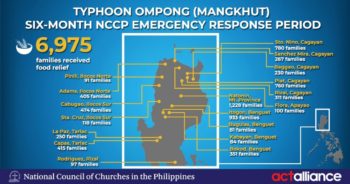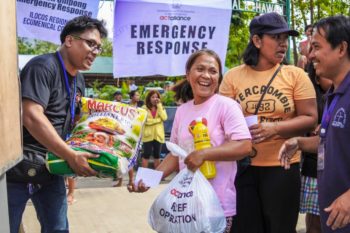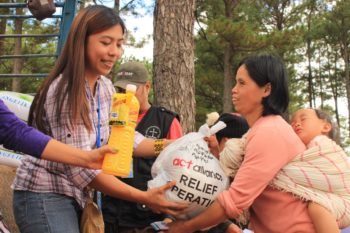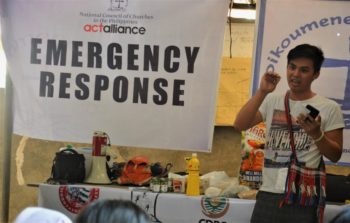
Typhoon Ompong, internationally named Mangkhut, made landfall on September 15, 2018. The 900-km wide typhoon carried winds of up to 205 kph across four regions in Northern Luzon. According to the UN Office of Coordination for Humanitarian Action (UN OCHA), more than 1.6 million people were affected by the typhoon, most of whom were from the farming population.
ACT member the National Council of Churches in the Philippines (NCCP’s) emergency response has reached 6,975 families in 18 municipalities within 8 provinces and across five regions. The humanitarian response has been supported by various ACT Alliance members and based off of nationally-led assessments.
“Based on the results of our assessment, we opted to concentrate on food relief. We focused on areas that were not immediately reached by the government and those that did not have assistance from other organisations,” said Almond del Rosario, NCCP’s Emergency Response Lead Officer.

Food packs were distributed to provide survivor families with food security for at least two weeks. The faith-based group, International Care Ministries, supported NCCP’s emergency response with a generous donation of 45,000 nutrient-enriched rice packs, known as ‘Manna packs’ which were distributed in addition to the standard food packs.
“We ensure this quality of food relief to help alleviate hunger and to support the capacities of survivors to recover from the disaster,” said del Rosario.
The Council assisted isolated families affected by Typhoon Rosita in Natonin, Mt. Province. It also responded to the needs of the Dumagat, indigenous people in Rodriguez, Rizal that were affected by the monsoon rains that followed Typhoon Ompong.
Continued support towards early recovery
Issues of landlessness and inadequate government support to the agricultural sector have placed Filipino farmers among the poorest in the country.
The poorest farmers of Northern Luzon faced the brunt of the disaster inflicted by Typhoon Ompong, “at the time when the typhoon struck the Northern Luzon region, farmers in the Cagayan area were just a few weeks from harvest,” said del Rosario.

“The vulnerabilities that Filipino farmers experience are escalated in disaster situations. Some families scavenged for crops that were meant as feed for livestock for their consumption after Typhoon Ompong swept through their farms,” said del Rosario.
In the coming months, the NCCP will continue providing support to the recovery of the disaster-struck communities through agricultural assistance initiatives, including the provision of seeds and farm tools. The Council also plans to help rehabilitate community water systems and to repair shelters that were damaged by the typhoon.
Support for community disaster resilience
High exposure to hazards including typhoons, extreme weather events and severe physical, environmental and socio-economic vulnerabilities makes the Philippines extremely prone to disasters. As NCCP provides immediate relief and support for the recovery of disaster-affected communities, it also engages in advocacy for community-based disaster preparedness.
Alongside churches, the Council partners with local government units are highlighting the importance of community-based disaster risk reduction (DRR) in strengthening the resilience of communities. NCCP provides educational activities in locally-recognised high-risk areas to increase awareness on DRR and reminds community members of their role in disaster preparedness.
“It is important to recognise that each community has the capacity to be resilient and to be proactively prepared for hazards. Educational activities remind disaster-affected communities that each member has a role in creating a culture of disaster preparedness and resilience,” said Patricia Mungcal, NCCP Education and Training Officer.
Churches in solidarity
“Typhoon Ompong came when we were just wrapping up our emergency response to the flooding caused by the monsoon winds in the various areas of Luzon. We were in Mindoro, an island in the southern part of Luzon when Typhoon Ompong made landfall,” said Edward Santos, NCCP’s Humanitarian Response Manager.
“It is good that the church people organised in regional Ecumenical Disaster Response and Management Committees, and they were active and alert at that time,” he added.

“A strong partnership between the church and the community makes big tasks lighter. The presence of the churches in the community also serves as an inspiration to the community to unite and organise themselves, and to move towards resilience,” concluded Santos.
The Council’s interventions in the impacted communities are in partnership with its member churches in the affected regions including, the Cagayan Valley Regional Ecumenical Assembly, Ilocos Regional Ecumenical Council, Regional Council in the Cordillera, Pangasinan and Central Luzon Ecumenical Assembly, other faith-based groups, volunteers and people’s organisations.
